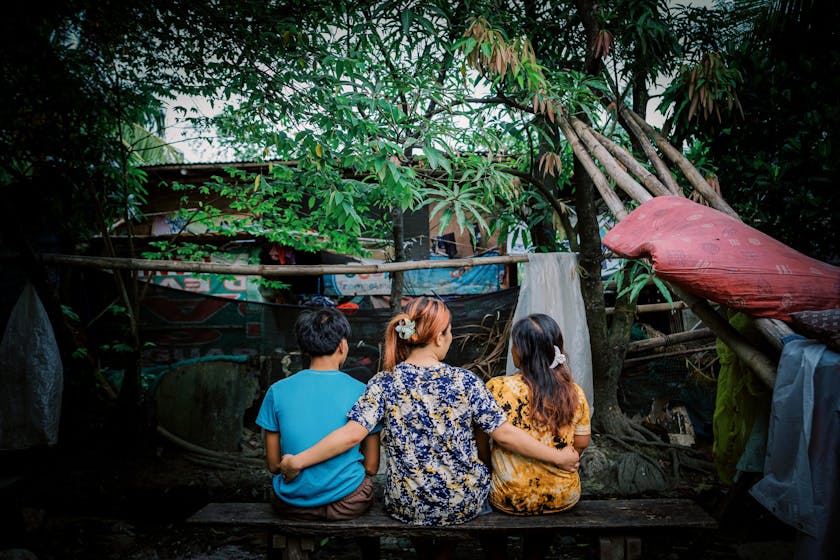Leading by example: Learning work and life skills while overcoming harmful social and cultural norms
It was so hard to find a job because I didn’t have any skills. But after joining the programme and with its help, I now have a job, and it’s easier for me to find work because I’ve learned life skills.
— Jane, on how the program helped her
Residents of the barangay near Iloilo City’s dumpsite still hold the notion that a woman has already been “left behind” if she isn’t a mother at around 15 years old. This belief continues to influence most teenagers’ behaviour, including Jane, who quit senior high school to give birth at 19.
Like most children in her neighbourhood, Jane had to scavenge to survive. She was always searching, constantly collecting, and making do with what others had discarded. She never ventured or explored far beyond her comfort zone and, despite eventually finishing high school, didn’t have the confidence to find a stable job that could support her and her child.
She eventually re-enrolled and graduated, but was jobless and stayed at home to take care of her child. Jane lives in a single house with her parents, four siblings, and her partner. Her parents are scavengers, while the father of her child is a construction worker. Occasionally, she still looks for valuable items at the dumpsite – old cellphones or lost jewellery – to sell, which she says allowed her to eat three meals a day.
Learning life and work skills
“Before joining the programme, I felt excited and hopeful, even during the interview,” Jane recalls. She is referring to Terre des Hommes Netherlands partner Bidlisiw Foundation’s “Enhancing Self and Wage Employment Opportunity” (ESWEO) programme, for which she was recommended by their community watch group (CWG).
The programme helps participants improve themselves, teaches different soft skills, and prepares them for their chosen path towards economic inclusion – whether employment, entrepreneurship, or returning to school. Through various training sessions, ESWEO empowers participants to help them achieve their goals. Apart from the actual skills, significant changes also happen by providing an opportunity to meet other youths and make social and professional connections.
Enhancing Self and Wage Employment Opportunity. The program starts with a 3-day program that clarifies the participants’ personal goals and enhances basic life skills like problem solving, creative thinking, and communication. It is followed by weekly sessions that include evaluating realistic career options, learning personal financial management, and modules on work etiquette, job interviewing, and resume writing. Incorporated in the lessons are Labour Laws, the Magna Carta of Women, Safe Spaces Act, Labour Trafficking & Online Scams, and Sexual Reproductive Health & Rights.
Finishers of the program are continually supported (i.e. given an allowance) and monitored until gainful employment. There are additional sessions for those already in the workplace.
A chance at something better
Jane joined the programme in November 2023 and was given PHP 150 (USD 2.50) for meals and transportation for every session she attended until the end of that year. By 2024 she started training under TESDA in Iloilo and earned a National Certificate II in Housekeeping. She was hired by a partner manpower agency in June 2024 and was given a PHP 2,250 (USD 39) allowance every 15 days by the project until she was deployed to work at a checkout counter.
Job training. Housekeeping training consists of cleaning public areas and equipment, preparing guest rooms, providing valet services, and other skills in the hotel and restaurant industry. The Technical Education and Skills Development Authority (TESDA) provides or supervises the training and issues National Certificates (NC) to those who have passed an exam/assessment.

Although being a cashier is not directly related to her training, it is a regular job and certainly better than scavenging. Jane has asked the manpower agency, though, to let her know if a Housekeeping position is available. She would like to use her training and pursue her passion.
Job placement. Bidlisiw has a memorandum of agreement with a private company that hires workers and deploys them to various establishments under contract.
What’s next for Jane
I am very happy because I learned important life skills and I have been able to apply the sessions I learned in my life. And through Bidlisiw, now I have a job.
Jane can now provide for her family’s needs and wants. Apart from the basics, she can now afford ice cream and other simple things that bring happiness to her child. Jane has also become a role model for other youth in her barangay – a living example that staying focused on one’s goals helps in achieving them and helps change the culture in the community.

Neighbor Alice shares “I admire her determination and strength. I see her managing so much – raising a child, working, and still pursuing her education – and I am truly in awe of how she balances it all. It’s not easy and there are times when it must feel overwhelming… What she’s doing isn’t just about getting by, it’s about creating a future both for herself and for her family.”
According to the CWG that referred and monitored Jane during her training, they’ve heard other teens express their desire to change their lives, inspired by Jane’s journey. As for Jane, “My dream for the future is to build my own business so I can help my family and others who are in need.”
Author: Patrick Salamat

To combat WFCL, Terre des Hommes Netherlands, in partnership with Bidlisiw Foundation and Children’s Legal Bureau, and with funding support from the European Union, is implementing the project Strengthening the Community-based Protection Systems to eliminate Worst Forms of Child Labour (WFCL) in Visayas Region.




